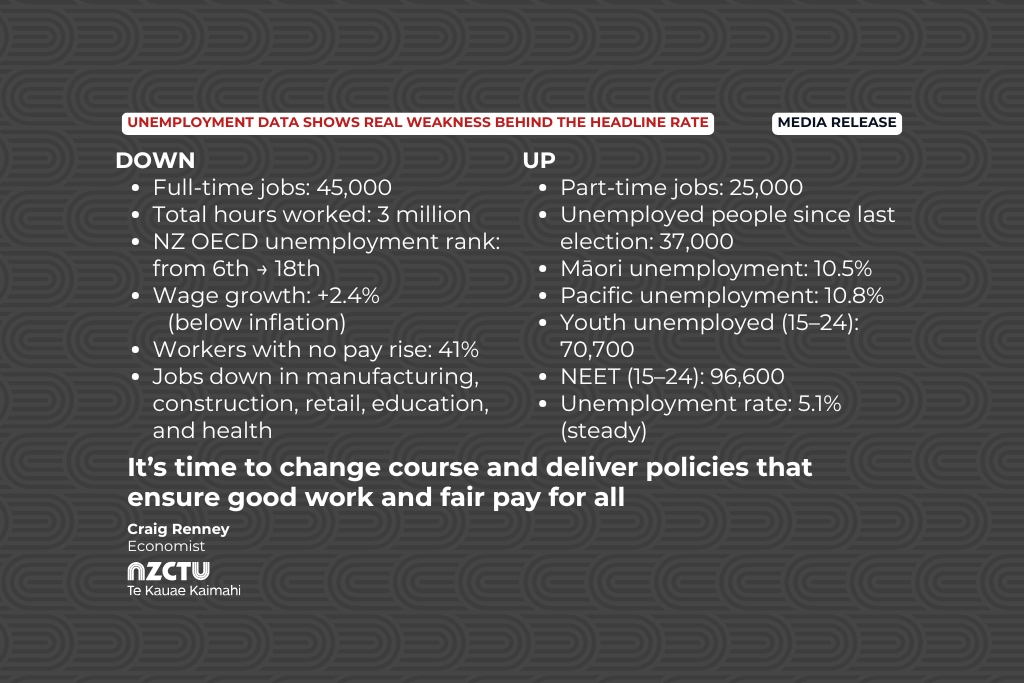Source: Govt’s austerity Budget to cause real harm in communities
Question No. 8—Health
8. Hon Dr AYESHA VERRALL (Labour) to the Minister of Health: Is his first priority as Health Minister still “focusing Health New Zealand on delivering the basics and achieving targets”; if so, why have wait times for first specialist assessment and elective treatments worsened?
Hon SIMEON BROWN (Minister of Health): Yes, you cannot manage what you don’t measure, and that’s why this Government reinstated health targets: to drive accountability and ensure access to timely, quality healthcare. Too many New Zealanders are waiting too long for first specialist assessments and elective treatments, and addressing this is a priority. Wait-lists have been growing over several years. Despite an increase in elective procedures and first specialist assessments being completed last year, the rate at which people were being referred on to wait-lists continues to outpace the rate at which people were receiving treatment or being seen. However, I’m pleased to inform the member that Health New Zealand advises me that the number of patients waiting for a first specialist assessment in the week ending 13 April has reduced by over 8,000 since the first week of January.
Hon Dr Ayesha Verrall: How can he expect others to be accountable for targets, if he doesn’t own up that there has been a 6 percent deterioration in first specialist assessments, and a 3 percent deterioration in elective treatments since the change of Government?
Hon SIMEON BROWN: If we’re going to talk about percentages, we could talk about the 6,500 percent increase in the number of people waiting more than four months for a first specialist assessment when that party was in Government; or we could talk about the 2,500 percent increase in the number of people waiting for an elective treatment more than four months, while that party was in Government. The wait-list ballooned. We’ve put in place targets. Now we’re focusing the system on delivery so that people can get the healthcare they need in a timely and quality manner.
Hon Dr Ayesha Verrall: Who does he expect to do the additional procedures, when Health New Zealand’s last quarterly workforce report shows 310 fewer nurses and 47 fewer doctors employed in our health system?
Hon SIMEON BROWN: There are more doctors and more nurses working at Health New Zealand than in 2023. We’re investing in front-line services and we’re focusing on ensuring that we treat the patients and get the timely and quality access to healthcare that is needed. As I said in my primary answer, I’m pleased to inform the member that Health New Zealand advises me that the number of patients waiting for a first specialist assessment in the week ending 13 April has reduced by over 8,000 since the first week of January. That is progress. Because of the huge wait-list that we inherited, it’s going to take time to deliver. I’m focused on delivery.
Hon Dr Ayesha Verrall: Does he stand by his statement “There is no such thing as a hiring freeze.”, or does he accept that official statistics now show hiring has been frozen?
Hon SIMEON BROWN: There are more doctors and more nurses working at Health New Zealand today than there were in 2023. We’re investing in front-line health workforces and we’re focusing on delivery. We’re investing $16.68 billion over three Budgets, so we can invest in the front-line services that New Zealanders need.
Rt Hon Winston Peters: Could the Minister confirm that with the last three answers on the statistical improvements that he gave in those answers, the primary question, or the questioner, was demonstrably, deliberately false?
Hon SIMEON BROWN: We’re focused on delivery. We’re focused on outcomes. We have more doctors and more nurses working at Health New Zealand today than in 2023. We’re focused on outcomes. As I said in my primary answer, 8,000 fewer people are waiting on the first specialist assessment wait-list for the week ending 13 April than in the first week of January. That’s progress. We inherited massive wait-lists which ballooned under the previous Government, and we are focused on getting patients the care they need.
Hon Dr Ayesha Verrall: Why did he try to blame senior doctors for longer waits for treatment, when it is his Government’s hiring freeze that means New Zealanders are going without the care they need?
Hon SIMEON BROWN: I was very clear when it came to the union deciding to go on strike that they should have put the offer that was presented to them a week prior to the strike to their members to vote on, rather than going on a strike which has caused 4,300 elective treatments or first specialist assessments to be delayed. That’s unacceptable. We must put patients first.
Debbie Ngarewa-Packer: Supplementary.
SPEAKER: Question No. 9—just waiting for a bit of quiet.
Debbie Ngarewa-Packer: Supplementary.
SPEAKER: Oh, supplementary. Debbie Ngarewa-Packer.
Debbie Ngarewa-Packer: Thank you. How does the ministry’s decision to remove ethnicity as a factor in wait-times align with his targets to reduce wait-times when Māori are still waiting longer for treatment than non-Māori?
Hon SIMEON BROWN: Our Government is very clear: we are focusing on need and we’re focusing on making sure that we are ensuring that patients get the treatment they need in a timely and quality manner, and that applies to all New Zealanders.
Debbie Ngarewa-Packer: Point of order. That was a mischaracterisation of the actual question. The question, which is an equity-based, policy-based, needs-based—
Hon Judith Collins: Just ask the question.
Debbie Ngarewa-Packer:—addresses Māori and Pacific Islanders, and there wasn’t actually an answer in that—thanks, Judith.
SPEAKER: Well, the Minister could say the same thing again if he likes.
Hon SIMEON BROWN: The Government is focusing the health system to treat people based on the needs that they have and ensuring that all New Zealanders can get the access to timely and quality healthcare.
Debbie Ngarewa-Packer: Supplementary.
Rt Hon Winston Peters: Supplementary question.
SPEAKER: Supplementary—Debbie Ngarewa-Packer.
Rt Hon Winston Peters: How did that go?
SPEAKER: Because she was faster off her feet.
Rt Hon Winston Peters: No, she wasn’t.
SPEAKER: Yes, she was. I’m pretty sure. Debbie Ngarewa-Packer—it was like a blur; you could hardly see it.
Debbie Ngarewa-Packer: Thank you. How will proposed cuts to Māori and Pacific health and immunisation providers, many of whom serve high needs and hard to reach whānau, achieve his target to increase immunisation rates for children to 95 percent at 24 months?
Hon SIMEON BROWN: Well, this Government is very much focused on delivering on the basis of need. We continue to invest in providers who serve a variety of communities to ensure that we are reaching out into Māori and Pacific communities so that we can meet those targets. But as I said in the previous answer, we are focusing healthcare delivery on the basis of need so that all New Zealanders can access timely and quality healthcare.
Rt Hon Winston Peters: Can I ask the Minister as to why on earth he hasn’t consulted with Ayesha Verrall, who’s an absolute expert on medical waiting lists and endless delays?
SPEAKER: No. Is there another question?
Debbie Ngarewa-Packer: Yes. How does his decision to cancel bowel cancer screening for Māori and Pasifika from the age of 50 align with his target of faster cancer treatment for 90 percent of patients when these groups have the highest rates of bowel cancer in the country with 18 percent of cases diagnosed under the age of 50?
Hon SIMEON BROWN: Well, we’re focusing on, as I said, healthcare delivered on the basis of need. We are lowering the age for all New Zealanders to be able to access bowel cancer screening to the age of 58. We are also making targeted investments to target those communities—Māori, Pasifika, Asian communities—where they have lower bowel cancer screening rates, to lift those rates so that we can save as many lives as possible.



